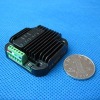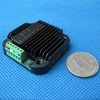- Gearboxes[1]
- Motor Driver[10]
- Other Motor Accessories[1]
- Stepper Motor[10]
- Wood Router[2]
- Packaging Machinery Parts[1]
- Motor Controller[5]
- Apparel Machinery Parts[2]
- DC Motor[1]
- Solar Energy Systems[1]
- Contact Person : Mr. Huang Tiger
- Company Name : Shanghai UI Robot Technology Co., Ltd.
- Tel : 86-21-33925935
- Fax : 86-21-33925935
- Address : Shanghai,Shanghai,B104, No. 456 Bibo Road, Zhangjiang Hi-Tech Park, Pudong, Shanghai
- Country/Region : China
0-2 amps adjustable output current UIM24002 stepper motor driver
UIM 24002 stepper motor driver
0.5-2A settable output current.
Miniature size 42.3mm*42.3mm*13.5mm
Integrally designed to fit onto motors seamlessly, as well as work standalone
10-35VDC supply, Max 2A adjustable output current
Full, half, quarter and 16th Micro-stepping
Dual H-bridge with PWM constant current control,
Enable/shutdown controllable
Opto-isolated inputs with common anode.
Die-cast aluminium enclosure
| Power Supply | Phase Current |
| 10-35V DC | 0-2 amps |
A stepper motor is a kind of electric motor with an internal rotor containing permanent magnets and a set of electro-magnet coils around the rotor which are switched electronically. Stepper motors "cog" to a limited number of positions, but with a microstepping controller, which partially activate ajacent coils so that the rotor rests between positions, stepper motors can rotate more smoothly.
Advantages: The primary advantages of stepper motors are that since they will move only as the controller changes the coil that is energized, the position of the motor can be known without any external feedback. Although it is possible for the motor to be turned out of phase with the coil exitation, which is know as skipping or missing steps, in most cases the reduced cost of the system is justified. Stepper motors are "brushless" unlike most other motors and so generate less EMI.
Disadvantages include lower power effeciency, higher cost per unit, and the need for a more complex drive circuit aka controller.
Control Signals: The stepper motor controller typically accepts two inputs from an external source: Step and Direction. The Direction signal set the direction of rotation and each pulse on the Step signal causes the controller to move the motor one step in that direction. The controller translates these signals into different patterns of current flow in the coils, which result in the movent of the motor.
Application: Stepper motors excel at driving loads needing up to about 100 Watts of power to move at less than a few hundred RPM with accuracy of 1/200th of a revolution. Lighter loads can be driven faster or with more accuracy. Stepper motors are commonly used to convert milling machines to CNC control.
0-2 amps adjustable output current UIM24002 stepper motor driver


